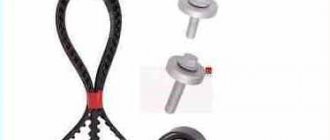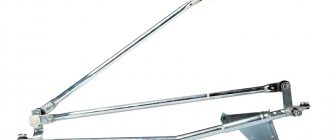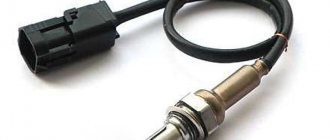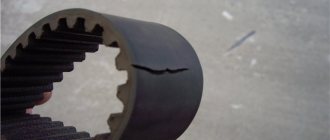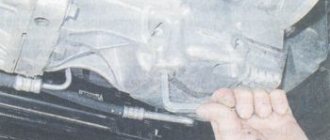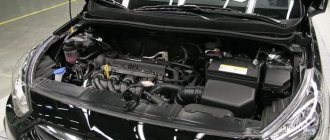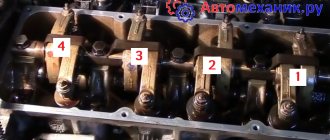According to the operating rules of Renault Duster, the timing belt must be replaced when extraneous noise occurs from the engine compartment or every 60 thousand kilometers. Failure to do this will result in the need for costly repairs over time. If necessary, manipulations are carried out earlier. When in doubt what to install when replacing a Renault Duster timing belt - a chain or a belt - it is recommended to contact a specialist. Both options have their advantages and disadvantages.
When is it time to change?
The service life of timing kits on Duster is 4 years or 60 thousand kilometers. However, in real conditions the procedure is performed more often. This is explained by the fact that the car is exposed to external influences, as a result of which the structural parts wear out faster.
The system in which this element takes part consists of many components:
- 1-2 camshafts;
- intake and exhaust valves;
- drive shafts and others.
The operation of the system is ensured by either a timing belt or a chain. The latter is more reliable, as it is made of metal. The operational life of the chain on Duster is 300 thousand kilometers. The main disadvantage of the chain is that to install this element, a special tensioner is used, which must be replaced after 100 thousand kilometers.
Moreover, this indicator may decrease with active use of the Renault Duster. If problems arise with the operation of the tensioner, or the chain is stretched under the influence of certain factors, the sprockets on it may jump several teeth. Because of this, the motor does not function correctly, which leads to failure of the power plant.
The toothed belt used on the Duster is less reliable compared to a chain. Determining the service life of this element is quite difficult. However, a timing belt is much cheaper than a chain. In addition, the first one is easier to install. A broken timing belt or other problems cause the valves to bend (sink).
Installed motors
The year of birth of this car is considered to be 2010, when it first appeared before potential owners. Owners and many automotive experts consider this car unique in its capabilities in its class. It is a light crossover, which has very high maneuverability, has good cross-country ability on unimproved roads, and consumes a relatively small amount of fuel.
The Renault Duster can be purchased with both all-wheel drive and front-wheel drive. The car with all-wheel drive is equipped with a gearbox that has 6 gear shift stages. This allows you to move in comfort on roads of different technical conditions. The first models used the K4M engine as a power unit, later it was replaced by the H4M. A chain or belt is used to drive the timing mechanism.
Motor K4M
The K4M power unit has a displacement of 1600 cm3, has several different modifications, and is intended for installation on cars of this concern. The basis for this engine was the K7M engine, which received a new cylinder head with 16 valves. To drive them, two camshafts were installed, which turned out to be lightweight, and their own pistons were also developed. The thermal clearance in the valve mechanism is regulated by hydraulic compensators.
Engine K4M
A number of engines are produced with a phase regulator; the compression ratio of the working mixture can be from 9.5 to 10 units. The power unit power declared by the manufacturers is 102 hp, but some modifications can produce 135 hp with the same displacement.
A timing belt is used to drive the timing mechanism. This requires strict adherence to all factory recommendations for engine maintenance, since a broken toothed belt leads to damage to the valve mechanism. In this case, an expensive overhaul of the engine will be required.
Motor N4M
In 2006, production of a new engine began, which replaced the well-known K4M. The improvements affected many components and parts. So, with the same working volume, the compression ratio became 10.7, this allowed the output to have power from 108 to 116 hp.
In the timing mechanism drive, the toothed belt was replaced with a metal chain. The thermal clearance of the valve mechanism is periodically adjusted every 80–100 thousand kilometers by selecting the thickness of the pushers. The appearance of third-party sounds under the valve mechanism cover is a clear sign that the thermal clearance needs to be adjusted.
Engine N4M
The engine is not critical to the choice of fuel; it works equally well on both 95 and 92 gasoline. Some engine modifications have two injectors on each working cylinder. And you can also change the valve timing; a phase shifter is installed in the intake tract; the throttle valve of this engine is electronic. The designers made sure that the engine complies with Euro 5 standards. It is possible to tune the power unit in various ways.
Integrity Criteria
It is important not only to know when to change the timing belt on a Renault Duster, but also to understand the features of the entire process. The procedure is carried out if the following circumstances are detected:
- peeling of the materials from which the belt is made;
- any defects on the surface;
- a bend from which the cord threads come out;
- traces of burning or oil.
There are many reasons for rapid timing belt wear. Among them are factory defects and stretching of mechanism elements. Also, wear of pulleys and teeth leads to defects on the timing surface. The need to quickly replace the element is indicated by an extraneous sound coming from the engine compartment.
Tension check
The tension of the timing belt on the Duster is checked as follows:
- It is necessary to unscrew the bolts and nuts securing the upper cover of the gas distribution mechanism. A 13mm socket is used for this.
- After removing the cover, the bolt securing the crankshaft pulley is turned. This element is rotated using head 18.
After performing the described manipulations, you can assess the condition of the timing belt. Defects that require replacing the gas distribution mechanism on a Duster are described above. The situation is considered normal when marks 2 (on the tensioner) and 1 (on the gas distribution mechanism) coincide with each other. If the first is slightly displaced relative to the last, then it is necessary to tighten the elements.
In this case, you must perform the following steps:
- Loosen the nut that secures the parts of the mechanism (use a 13mm wrench).
- Turn the tension roller clockwise (use a hexagon). The pointers must match.
- Tighten the nut.
- Turn the crankshaft twice. It must be moved using the bolt that secures the drive pulley.
- Repeat the manipulations if the marks do not match again.
It should be noted that in the Duster modification, equipped with a 2-liter engine, there are no phase indicators. Therefore, to replace the timing belt in this case, you will need a special tool and devices with which the shafts are fixed. In addition, the manufacturer recommends installing new tension and idler rollers simultaneously with the belt.
List of works during maintenance 1 (15,000 km)
- Changing the engine oil
. Oil standards determined by the manufacturer for gasoline engines must be no lower than API: SL; SM; SJ or ACEA A2 or A3 and with SAE viscosity level: 5W30; 5W40; 5W50; 0W30; 0W40, 15W40; 10W40; 5W40; 15W50.
For diesel unit K9K
it is necessary to pour Renault RN0720 5W-30 oil recommended for diesel engines that meet the requirements of EURO IV and EURO V. If the car is driven with a particulate filter, then it is recommended to fill it with 5W-30, and if not, then 5W-40. Its average cost in a volume of 5 liters, article number 7711943687 - 3100 rubles; 1 liter 7711943685 – 780 rubles.
For petrol engine 1.6
16V, as well as for the 2.0 engine, suitable lubricant is ELF EVOLUTION 900 SXR 5W30. For a five-liter canister 194839 you will have to pay 2300 rubles, four liters 156814 costs 2000 rubles, and the price of oil in liters is 700 rubles.
- Replacing the oil filter
. For the 1.6 16V (K4M) engine, the original will have Renault article number 7700274177. For the 2.0 (F4R) - 8200768913. The cost of such filters is within 300 rubles. The diesel 1.5 dCi (K9K) costs Renault 8200768927, it has a larger size and a price of 400 rubles. - Replacing the air filter
. The number of the original filter element for gasoline engines is Renault 8200431051; its cost is about 560 rubles. For a diesel unit, the Renault filter 8200985420 will be suitable – 670 rubles. - Replacing the cabin filter
. The catalog number of the original cabin filter for cars with a climate control system, without air conditioning, is 8201153808. It costs about 660 rubles. For a car with air conditioning, a suitable filter will be 272772835R - 700 rubles. - Replacing the fuel filter
. Only for modification with a diesel engine, it is recommended to replace the filter with article number 8200813237 (164002137R) - 2300 rubles. already from the first maintenance, and every 15-20 thousand km.
Checks during maintenance 1 and all subsequent ones:
- Engine control unit and diagnostic computer
- The tightness of cooling, power and exhaust systems, as well as the condition of hoses, pipelines and their connections.
- Clutch drive
- Protective covers for wheel drive joints.
- Tires and tire pressures.
- Hinges and cushions of anti-roll bars, silent blocks of suspension arms.
- Ball joints.
- Front and rear shock absorbers.
- Fluid level in the power steering reservoir.
- Covers for the steering gear and tie rod ends.
- Brake fluid level in the reservoir.
- Hydraulic brakes, condition of pipes and hoses.
- Front wheel brake pads and discs.
- Cleaning the brake pads of the rear wheels from dust.
- Battery voltage using a tester.
- Lamps for external and internal lighting.
- Signal indicators in the instrument cluster.
- Windshield and rearview mirror.
- Windshield and tailgate glass wiper blades.
- Anti-corrosion coating.
- Lubrication of the hood latch and its performance.
Original or analogue
The choice in favor of the original timing belt for the Duster or an analogue depends mainly on the preferences of the car owner. Some third-party kits (INA, SNR and others) are more expensive than a Renault brand gas distribution mechanism. In addition, a number of models are produced under different markings, which creates some confusion when choosing components.
Among analogues, in terms of price and quality, timing belts for Duster from the Gates brand stand out. This company produces gas distribution kits with a QR code, which can be used to determine the authenticity of the kit. Also, the Duster with a 1.6-liter engine is equipped with a timing belt manufactured by AvtoVAZ for the Lada Largus.
Necessary tools and accessories
Since this is a Renault Duster, we will need a “Set of clamps for Renault-Nissan K4J, K4M, F4P, F4R engines”, the price is about 2500, or you can make it yourself, drawings are attached. A set of keys and heads, necessarily 15, 16, 18, as well as hexagons and Torx bits.
Installing the mechanism yourself
It should be noted that in the crossover modification equipped with a 2-liter engine, there are no marks along which the belt is tensioned. Therefore, to replace the timing belt on a Duster in this case, it is necessary to send the car to a service station, where the shafts will be fixed using special tools. In addition, the manufacturer recommends installing new tension and idler rollers simultaneously with the belt.
At a certain stage of the replacement, the participation of an assistant will be required.
Tools
Before you start replacing the timing belt on a Renault Duster, you need to prepare a number of tools and spare parts:
- gas distribution kit;
- set of heads and keys for 8, 13, 16 and 18;
- hexagon;
- screwdrivers.
In addition to the timing belt, the kit should include tension and idler rollers, and fasteners.
Step-by-step instruction
To change the timing belt on a Renault Duster, you must first remove:
- motor support;
- right front wheel;
- crankcase protection;
- other details that hide access to necessary elements.
Next, the manipulations described in the paragraph about checking tension are carried out.
The process of replacing the gas distribution mechanism kit is carried out in the following steps:
- The drive of auxiliary units (power steering generator and air conditioner) is removed.
- The second cover of the gas distribution mechanism, located at the bottom of the cylinder block, is removed. To do this you will need an 8 key.
- The assistant puts the Duster on the handbrake, moves the gearshift lever to maximum gear and depresses the pedal. You also need to use a screwdriver to pull out 2 plugs located on the filter side on the left side of the motor and insert a 75 mm bolt into the holes. These actions block the crankshaft.
- The tensioner mounting nuts are loosened. To do this, use a key of 13. The roller must turn counterclockwise.
- The belt is removed, and the tensioner is used with a Torx key.
- The support and tension rollers are removed.
The operation is then carried out in reverse order. First, the belt is put on the crankshaft from the toothed part. It is important during installation to position the belt so that the marks correspond to the direction of rotation.
At the last stage, you need to remove the bolt that secures the camshaft and rotate the crankshaft clockwise. Thanks to these actions, the timing belt is tensioned. The grooves should be in the desired position at the end of the manipulations.
Some features
To reduce the effort when cranking the shaft on gasoline engines, the spark plugs are unscrewed, the replacement of which is combined with the restoration of the timing drive.
The manufacturing plant produces sets of devices for holding the crankshaft at the top dead center position in the first cylinder. The grub screw is screwed into a channel in the engine block, with the Renault logo on the camshaft gears positioned close to the top point. When holding the motor shaft with a mounting blade, it is important not to damage the teeth of the motor position sensor.
The elements are located next to the starter ring, but are distinguished by their large size and flat top. It is possible to service gasoline engines by applying marks to the gears and engine crankcase. The procedure for determining the relative position in this case is carried out using the top dead centers in the first and fourth cylinders. After installing the belt, you must manually crank the engine, checking that there are no contacts between the valves and the piston heads. Source:www.dusterok.ru
List of works for mileage 90,000, 150,000 km
- All work that needs to be done during maintenance 1 and maintenance 2 is repeated.
- Replacing brake fluid. The filled fluid must comply with the DOT4 standard. The cost of the original Elf Freelub 650 DOT4 brake fluid (product code 194743) is 800 rubles.
- Replacing the working fluid in the clutch hydraulic drive. Replacing this fluid must be done simultaneously with changing the brake fluid in the hydraulic brake drive.
- Replacing the coolant. The original coolant GLACEOL RX (type D) is poured. Catalog number of the liquid (green) 1 liter, Renault 7711428132 – 630 rubles. KE90299945 – price per 5 liter canister. – 1100 rub.

